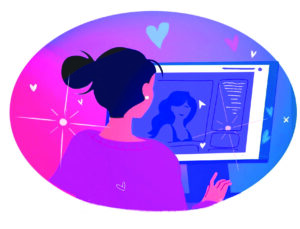What do celebrities owe their fans? Despite the amount of content we consume from celebrities, like media, music, and film; we are not as embedded in their lives as we may think we are. Our investment in the lives of the rich and famous is an example of parasocial relationships. The term has come into mainstream use in the last few years and describes the perceived relationship between someone and, typically, a public figure. For some, they may feel as if they know Taylor Swift. The careful construction of her public image over her career has solidified her reputation. Swift feels like a friend because her lyrics are relatable, her relationships evolve publicly, and she tries to interact and connect with fans. However, she does not know you. But we all have personal feelings and opinions about her, which collectively influence public relations and responses, and influence their art.
Ariana Grande has made her long-awaited comeback for her seventh studio album, eternal sunshine, with the single “yes, and?”. The song’s main themes of independence and personal growth seem like an intentional response to the criticism Grande has received this past year. Rumours and discussions about her divorce from California realtor, Dalton Gomez, have been circulating the internet. The news of the couple’s divorce was soon accompanied by homewrecking allegations against Grande. Allegations included rumours of her coupling up with Wicked co-star, Ethan Slater, who was previously married and had a young son with his ex-wife. Slater’s ex-wife divulged to the press that Grande was not “a girls’ girl.” This scandal in turn fed an online frenzy into Grande’s character, and comments about Grande ruining a happy family, being selfish, and a diva, were all over the internet. The court of public opinion is ruthless and cunning; nothing is typically forgotten. When female artists are faced with allegations and rumours about their personal lives, it tends to stick. Swift is still faced with accusations and shame from the media for being openly public with her boyfriend Travis Kelce. A “reputation” era is not made by the artist, but by society. For Grande and Swift, our perceptions of them influence their art. Reputation does not happen without the mass backlash towards Swift fed by the Kardashians. Grande cannot create thank u, next without facing criticisms for having many romantic relationships. For us, our return from parasocial relationships consisting of public comments and perceptions is the consumption of their media. Continual support for a celebrity is ‘buying what they are selling’, this is the giving end of parasocial relationships: commodities.

Parasocial relationships are not inherently malicious. For those with low self-esteem, these relationships allow for safe connections. There is no rejection in a parasocial relationship and people gravitate towards the comfort found in them. There is an online sense of community, or fandoms, which allow for genuine connection with peers. However, it comes at the expense of the artist. Any discrepancy in a perceived reality can alter the relationship drastically. Swift was known to be dramatic and self-centred, so writing songs about her past relationships can be seen as tacky and petty. Her famous eras are not solely her own but defined by who she was aligned with at the time. We perceive artists as we wish to perceive ourselves; this is the beauty of parasocial relationships, celebrities are whoever we want them to be. Then, there is a space for us in their lives, to give comments and perceive them as we wish.
There is still space to fantasize about being part of the opulence that comes with being famous. However, in these desires to align with celebrities and potentially aim to insert ourselves into their world, it is commonly forgotten how forgiveness is out of the equation of parasocial relationships. Do we owe celebrities forgiveness? If we align with these people and see ourselves in them, should we not allow them the same space to breathe as we give ourselves?






One Response
To be vulnerable is to be brave. The definition being “uncertainty, risk, and emotional exposure”. It’s much easier to sit back and judge than to get in the arena like those celebrities and fight the good fight each day.